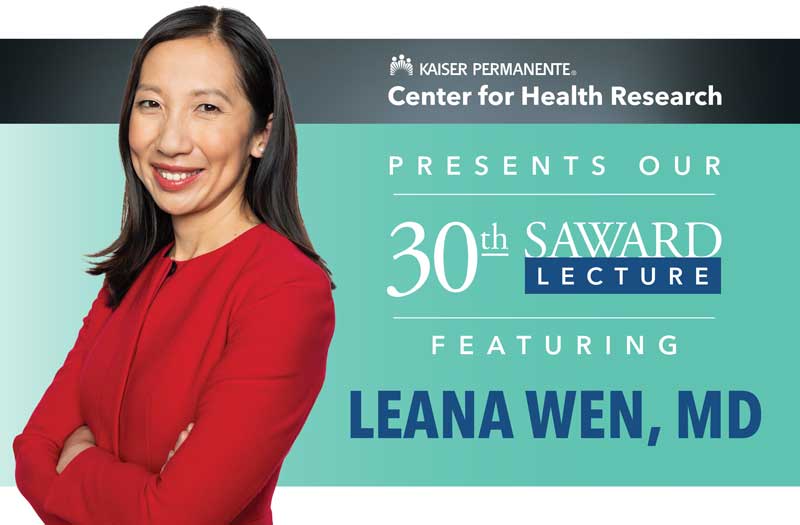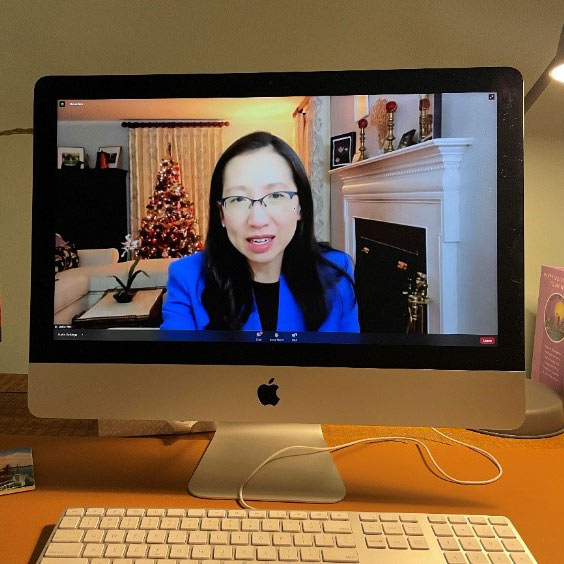
Dr. Wen described her experiences being on the front lines in the fight for public health
Watch the Saward Lecture Here »
The U.S. public health system functions relatively well. The problem is that it may fall victim to the loss of public trust, which would have dire results, says physician, columnist, television medical analyst and author Leana Wen, MD.
Dr. Wen, the featured speaker at the 30th annual Saward Lecture on Dec. 8, told hundreds who gathered online that the original title for a book she recently published was “Public Health Saved Your Life Today — You Just Don’t Know It.”
“Prior to COVID, our biggest concern in public health was that people didn’t understand it because public health is literally about prevention. It’s about stopping something from happening, so we are successful when nothing happens. But as a result, if there is no face of something, it becomes invisible. It becomes something that people don’t think about it.”
Then the pandemic arrived and public health was suddenly in the crosshairs. Dr. Wen revised the book and gave it a new title: “Lifelines: A Doctor’s Journey in the Fight for Public Health.”
“There’s one thing that keeps me up at night more than anything else,” Dr. Wen said, “and that is that COVID-19 has become so politicized that there might be knock-on effects on other aspects of public health.
“The previous concern was that no one cared about public health because it was invisible. Well now, everyone knows about public health. The problem is that in many parts of the country, public health has gotten caught up in ideological, cultural and partisan fights. I really worry about what this could mean.”
Speaking about the importance of a vital public health system, Dr. Wen pivoted to the personal, saying, “My own story is a story of public health.” Her family immigrated from China when she was a child and relied on federal medical and food programs. Later, as a physician, she witnessed a child dying of asthma because the family was undocumented and too fearful to call for help.
Currently an emergency physician in Baltimore and research professor at George Washington University in Washington, D.C., Dr. Wen served for four years as the health commissioner of Baltimore. She drew upon her experience there to offer three suggestions to the audience:
- Choose one area in which to make an impact. When she joined the Baltimore City Health Department, Dr. Wen zeroed in on one issue — addiction — and developed a multilayered program that ultimately saved the lives of thousands of residents.
- Be intentional about improving the lives of the most vulnerable. Here she talked about a program to reduce infant mortality in Baltimore.
- Strengthen public health. “It is up to all of us as health care providers, as members of the community, to do everything that we can,” she said.
Regarding the role of public health sectors, she said the federal government has the capability to and does process the volume of research studies to subsequently formulate sound health-related policies. And while she believes that the federal government indeed has a role in public health nationally, she said, “As a former local health official, I very much believe in local control. People on the ground who know their communities… are the ones who are most able to frame the conversation, to deliver the message, to tailor the intervention that is most appropriate for their population.”
 Dr. Wen delivering the 30th Saward Lecture Live
Dr. Wen delivering the 30th Saward Lecture Live
When asked her thoughts on strengthening the relationship between state and local public health officials and private sector health systems, Dr. Wen recommended caution. While she supports specific efforts, such as data sharing and vaccine drives, her concern is about “privatizing our very underfunded public health systems even more,” decimating a system that cares for the most vulnerable.
“The last thing I would want is for private health care systems or private insurers or others to step in and say, ‘We can do this better.’ …The more we privatize public health, the less we are building their internal capacity, the less able they are to respond to future pandemics and to their core public health function. …The short answer is I don’t think the private system should be doing more with public health, and in fact we should be strengthening the public health system itself.”
The Saward Lecture series honors the late Ernie Saward, MD, who established a Kaiser Permanente Northwest program in the 1960s that became the Center for Health Research. The annual lecture, which has been presented free to the Portland community since 1989, receives support from Kaiser Permanente Northwest Community Health.
This was the first time in the Saward Lecture’s 30-year history that the event was held virtually, due to the ongoing threat of the COVID-19 pandemic. If you missed the live event, you can view Dr. Wen’s lecture here, including her thoughts on the COVID-19 pandemic, and responses to audience questions and answers.
To sign up for our newsletter to be informed of future Saward Lecture events, sign up here.